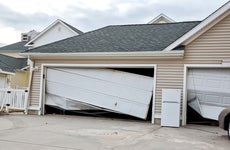
The Bankrate promise
At Bankrate, we strive to help you make smarter financial decisions. To help readers understand how insurance affects their finances, we have licensed insurance professionals on staff who have spent a combined 47 years in the auto, home and life insurance industries. While we adhere to strict , this post may contain references to products from our partners. Here's an explanation of . Our content is backed by Coverage.com, LLC, a licensed entity (NPN: 19966249). For more information, please see our .
When you own your home but have another place to live, renting out all or a portion of the house can seem like a smart way to bring in some extra money. Whether you rent your house out for a few weeks each year while you’re traveling or you bring in a full-time tenant, don’t assume your homeowners insurance policy will cover you. While most landlords purchase homeowners insurance to protect against certain types of damage to their property, it is generally not enough coverage if you’re renting out some or all of your home.
Rather, many landlords choose to purchase a policy that will specifically cover them from certain types of losses related to their rental property. Landlord insurance covers a lot of the same types of damage as homeowners insurance, but the critical difference is that landlord insurance will cover the property while it’s being rented. A standard homeowners insurance policy, on the other hand, will not. With homeowners insurance, much of the coverage stops shortly after the owner ceases to live there. For this reason, anyone interested in renting their home may want to take the time to learn about landlord insurance.
What is landlord insurance?
If you own a building or part of a building that you plan to rent, you need landlord insurance to protect yourself and the building. Landlord insurance is coverage designed to protect the structure of a home or condo when you, the owner, don’t live in it. Like standard homeowners insurance, it also covers your liability.
Almost all home insurance policies exclusively cover owner-occupied homes. If you’re not living in your house, your policy isn’t in effect.
There are a few options for rental property insurance. If you’re renting out your home to a full-time tenant, a standard landlord policy can offer the protection you need. But if you’re only going to be doing a short-term rental, you may only need to add an endorsement to your home insurance policy.
If you plan to regularly rent out your home to short-term guests, talk to your insurance agent. Your rental may then constitute a business, meaning you need a commercial insurance policy for ample protection.
Who needs landlord insurance?
Anyone who is currently renting or plans to rent out their property probably needs some form of landlord insurance for financial protection. Homeowners insurance ceases to provide many of its coverages once the homeowner rents out their property instead of living there themselves. Once this occurs, landlord insurance becomes necessary to keep the property and tenants protected.
In general, renters are not held liable for many of the damage that can occur in a rental property. Instead, it is the property owner who is usually held responsible. Of course, there are some situations where a tenant is considered at fault, but these tend to be less common. This liability is one reason landlord insurance is so essential.
Types of landlord insurance coverage
When you buy a standard landlord insurance policy, you get a broad variety of coverage. Each of these coverages is subject to deductibles and limits and can vary between policies. Most landlord insurance includes coverage for:
Dwelling coverage
Just like a home insurance policy, the landlord insurance policy covers the structure of the home against specific perils. Covered threats generally include damage from fire, wind, storms, hail and lightning.
Dwelling coverage is one of the most important parts of a landlord insurance policy. If something happens to your property’s physical structure, dwelling coverage may pay for repairs. For instance, if a limb were to fall on the house and cause damage, dwelling coverage could help.
Coverage for other structures
Your policy can also protect other structures on your property, like a detached garage or a fence. While not all properties have multiple structures, this has become a standard component of landlord insurance policies. Those without extra buildings need not worry, but those with detached structures should ensure their landlord insurance policy includes this coverage. These structures can include garages, fences and sheds.
Liability protection
This portion of your landlord insurance is especially important. When you have tenants living on your property, you’re more exposed to risk. Fortunately, your policy covers your liability so you can rest easy knowing that even if your tenant slips on a step and tries to sue you, you’re covered. Landlord liability insurance helps with medical expenses and accidental injuries. Because property owners are generally liable for what happens on their property, this is an essential piece of any landlord insurance policy.
Personal property coverage
If you don’t store any personal property in your rental, you may not need this protection. But if you rent your building furnished or leave personal property — like security cameras or lawnmowers to service the property — in place, personal property coverage on a landlord policy can offer some protection
Loss of use coverage
Additionally, some rental property insurance policies include loss of use coverage, which steps in to cover missed rent payments if your rental becomes uninhabitable due to a covered peril. For example, if your tenant has to move out for a month so you can complete repairs after a fire, loss of use coverage can write you a check for the rent you won’t be able to collect.
Review your policy options and talk with an agent to customize your landlord insurance policy to meet your needs.
Where to purchase landlord insurance
Getting your landlord policy is a lot like getting any other insurance policy. The best way to understand your coverage options and to make sure you’re getting the best price is to shop policies from multiple insurance providers.
Some of the insurance carriers who offer landlord insurance include:
- Allstate: Allstate connects you with a local agent who can help you customize your landlord policy.
- Farmers: Farmers gives you customization options so you can create the right policy for you.
- Geico: Geico offers both home and condo landlord insurance and has an online quoting tool so you can start the process easily.
- Liberty Mutual: The online quoting tool helps you start the process of securing coverage quickly and easily.
- Nationwide: The standard landlord insurance policies include loss-of-use coverage.
- State Farm: State Farm also offers coverage for both rental homes and condos.
Some smaller carriers may offer landlord insurance too. Ask any provider you are interested in if this is something it offers.
How much does landlord insurance cost?
Even if you’re convinced you need this type of coverage, you’re probably wondering about landlord insurance cost. Be prepared to pay more than you paid for your home insurance policy. The Insurance Information Institute (Triple-I) says landlord insurance costs about 25 percent more than standard home insurance.
The higher landlord insurance rates come down to the increased liability you bring on when you have tenants. Not only are they more likely to litigate for things like slip-and-fall accidents, but renters also tend to be more negligent about maintenance than homeowners. This increases the risk of incidents on your property.
The best way to make sure you’re getting the most affordable landlord insurance possible is to get quotes from multiple insurance providers. Compare them to lock in the best price for your coverage.
Frequently asked questions
-
-
No, homeowners insurance policies do not include landlord coverage. A standard policy only extends coverage to owner-occupied structures, which means that these policies will not cover your rental property. If you own a rental property and want to protect it, you will likely need a separate landlord policy or another type of coverage instead. That said, there are situations in which homeowners insurance can protect possessions that you leave within your rented property, but those are generally limited.
-
Landlord insurance is not required to operate a rental property, but most landlords opt to carry this type of insurance in order to protect themselves from certain types of losses. And, if you have a mortgage on your rental property, your mortgage company will likely require you to carry this type of coverage. If you are planning to rent out a home that you bought with a mortgage loan, you may want to talk to your mortgage lender about the type of coverage they’ll require when you lease the home to a tenant.
-
While the standard landlord insurance policies include extensive coverage, protections from things such as burglary and vandalism often require a policy add-on. Coverage for burglaries and vandalism can generally be added to an existing landlord policy, but it will increase the premiums.
-
Every insurance company calculates their rates differently, which means that the cost of your landlord insurance can vary significantly from one company to the next. If you want to find the cheapest option for your specific situation, it can be helpful to identify the insurers you think will meet your needs and then get a quote from each company. By comparing personalized quotes, you can find the most affordable policy with the best coverage for your situation.
-
Correction, Feb. 10, 2023, 5:50 pm ET: The previous version of the article stated that coverage would not apply for personal property used for maintenance. This has been removed, as a landlord policy may offer some protection.
Related Articles



